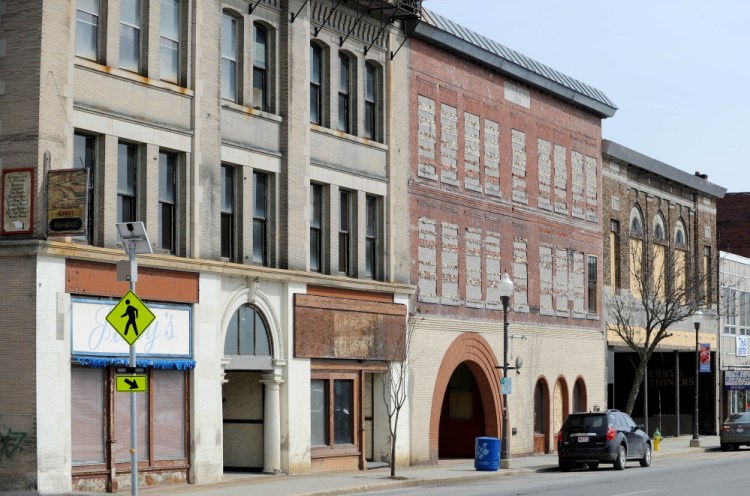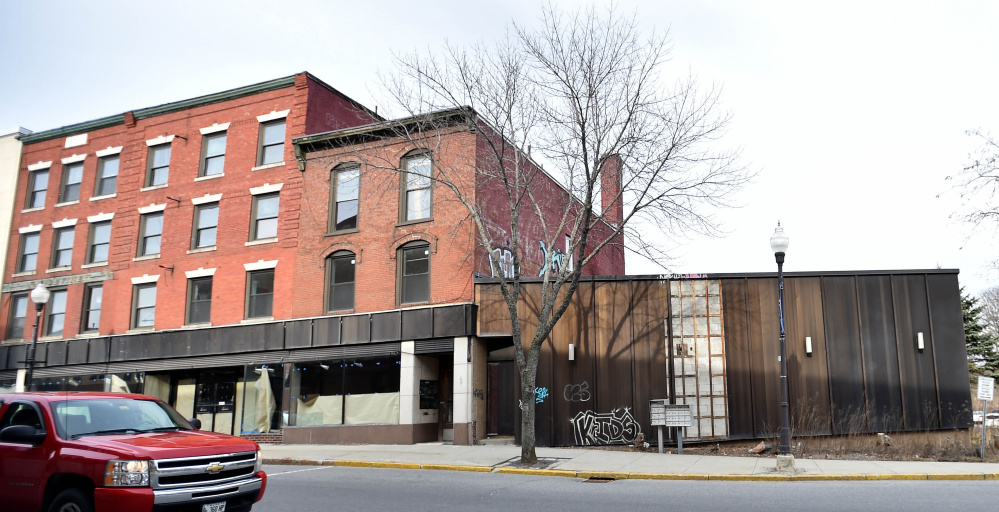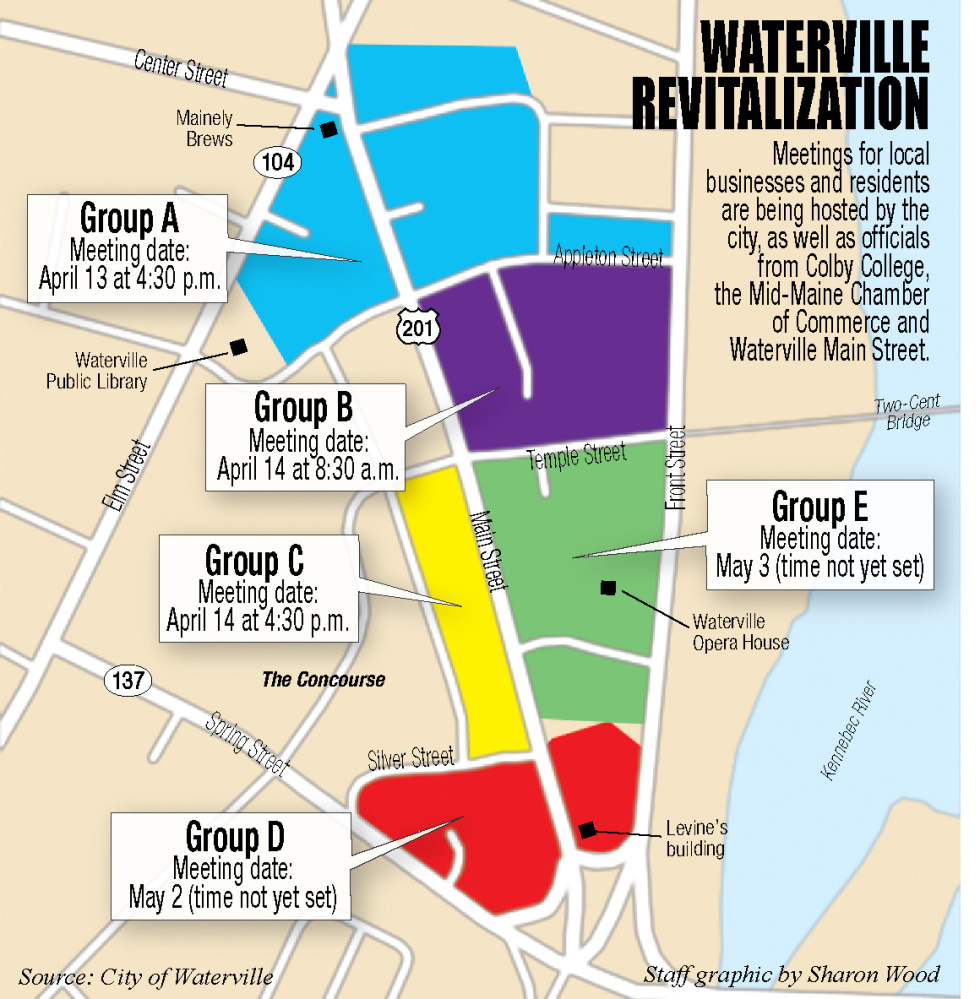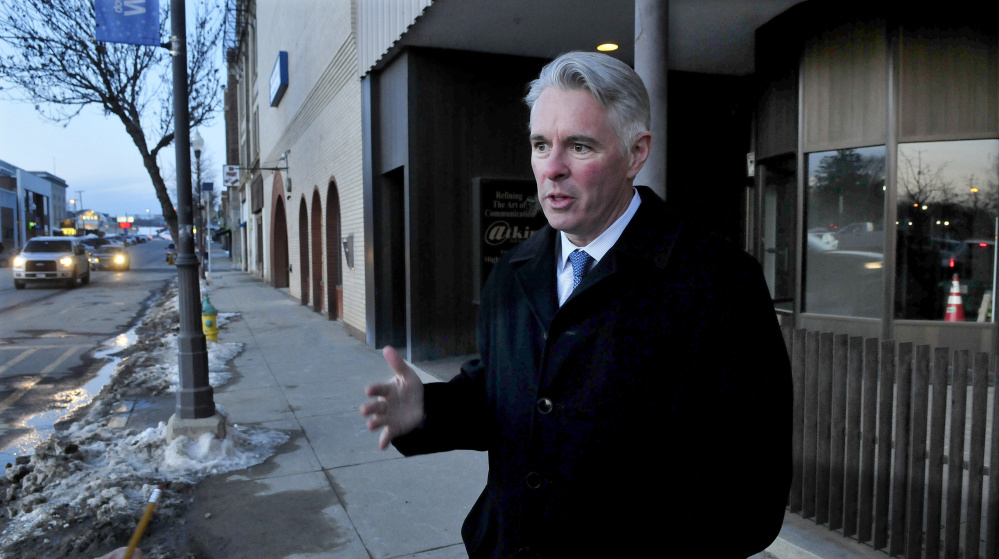WATERVILLE — The city is inviting downtown businesses and residents to a series of public meetings starting next week to discuss plans for downtown revitalization, gather input and talk about how redevelopment work might affect businesses.
The meetings are being hosted by the city and officials from Colby College, Mid-Maine Chamber of Commerce and Waterville Main Street, City Manager Michael Roy said at Tuesday’s council meeting.
“We want everybody to feel included, that’s for sure,” he said.
The meetings come as Colby’s plans to redevelop buildings downtown move forward. The college recently hired a full-time director of commercial real estate to oversee development.
Meanwhile, the city is extending the downtown historic district to include the area north of Temple Street to Appleton Street, to provide building owners access to historic tax credits for renovation work, Roy said.
Five meetings will be held in the council chambers on the third floor of 93 Main St. over the next five weeks, with the first meeting is scheduled for 4:30 p.m. Wednesday and the second and third meetings at 8:30 a.m. and 4:30 p.m. Thursday, April 14. Meetings also will be held May 2 and 3, at times to be announced, and officials will hold 30 minute, one-on-one meetings with businesses on the West Concourse, at times to be announced.
Roy said officials initially planned to meet with every downtown business, but determined that would be too time-consuming, so they divided the downtown into five sections. He said business owners and residents can go to a meeting in any section if they can’t make the one where they live or own a business.
“The purpose of the meetings is to listen and gather input to help inform the transportation study that is underway and to provide a forum for broader questions about the efforts to revitalize the downtown,” Roy said in a memo Tuesday to businesses and residents.
He said the division into groups occurred because different areas of downtown are dealing with different issues.
Neil Kittredge, of the architectural and planning firm Beyer, Blinder Belle, will run the public sessions. The firm was hired to develop a downtown revitalization strategy, which the City Council adopted in February.
COLBY’S ROLE
Colby has hired Paul Ureneck as its first full-time director of commercial real estate. Ureneck, who has worked on projects for 30 years, will oversee all the properties and look at how the street as a whole can come together.
“We wanted somebody who had real depth of knowledge to be a great ambassador on the street,” Colby President David Greene said in an interview Monday at the Morning Sentinel.
Ureneck will work with the city, businesses, arts and cultural organizations and community groups to include them in revitalization efforts.
Colby bought five downtown buildings and is buying a parcel on The Concourse to build a dormitory for students and staff and faculty members, who would be part of a civic engagement and community service program and curriculum.
The college expects to partner with investors to renovate the buildings and create a hotel, offices, retail shops and art-related venues, such as galleries. Some of the buildings, including the former Levine’s building, might be razed, and new ones built in their places.
Greene led meetings last year with city officials, businesses and downtown advocates to discuss what the city needed to help spur economic development downtown, draw more people to live and work there and boost the arts. Redeveloping vacant and deteriorating buildings was identified as a priority.
Ureneck is a former partner and senior vice president of CBRE/Boulos Asset Management and has worked on projects including redevelopment in Portland, expansion of the Allagash Brewery, Pineland Farms in New Gloucester and the restoration of the Winslow Homer Studio in Cape Elizabeth.
Colby is working with several developers on a model for a boutique hotel downtown and Ureneck is scrutinizing the proposals, Greene said. The most likely spot for the hotel is the site of former Levine’s building at 9 Main St., although that’s not definite, Greene said.
“Until everything’s signed, sealed and delivered, it’s never a definite, but we are working to make it happen,” he said.
The hotel would have 45 to 55 rooms and be independent, so it would have a distinctive feel, Greene said.
“In all likelihood, we’d raze the building,” he said. “We’ve gone through it from a structural standpoint, and it’s in very poor condition.”
Visitors to the city, including families of Colby and Thomas College students and people attending the Maine International Film Festival, the Colby College Museum of Art, the Alfond Youth Center, the Quarry Road Recreation Area and other city attractions would be likely hotel clientele, he said.
The key to a successful downtown is population density — people living and working downtown, Greene said. “You can’t have a downtown where the sidewalks roll up at five o’clock.”
Colby officials are talking to a handful of developers about the proposed dormitory at the northeast end of The Concourse, on a 0.77-acre parcel the college is buying from the city for $300,000. The sale has not been finalized.
“That’s a project that has significant developer interest because it is a secure revenue stream,” Greene said. “We are guaranteed that the rooms will be filled.”
Following city rules that specify no residential units be on first floors downtown, Colby plans to have unique retail space on the first level of the dormitory, but no retail businesses have been announced.
Both Greene and Colby spokeswoman Ruth Jackson said Colby students are excited about having a dormitory downtown, as they want to be involved in Waterville, and such safe and high-quality housing also provides them another step toward independent living. About 150 of Colby’s 2,000 students live off campus, including those who are studying overseas, according to Greene. About 1,850 students live on the Mayflower Hill campus.
The Waterville Downtown Farmers Market held on Thursdays in warmer months on that section of The Concourse will continue to be held there this coming summer, and discussions are ongoing to determine a suitable spot for it in the future, Jackson said.
Mayor Nick Isgro recently opened Napoli Italian Market downtown with Holy Cannoli owners Candace and Tom Savinelli. Greene pointed to the market as the kind of activity that will bring more people downtown and add to a vibrant Main Street.
“The more that that happens, the better off we’ll be,” he said.
Colby and the city for years have had a symbiotic and supportive relationship, which Greene thinks is the reason he has not heard much opposition to Colby’s role in helping to redevelop Waterville. Many years ago when there was a push to move the college to Augusta, for instance, Waterville residents fought to keep it in the city, he said.
“I think the partnership and relationship between the city and college has been powerful, and people know about it,” he said.
Greene has heard frequently that people appreciate the relationship and ongoing partnership.
“It has been extraordinary, and people are grateful for the support and investments that we’re making.”
Greene said some physical changes will occur downtown this year, and announcements about projects will be made in the coming months. The boutique hotel will be one of the early projects because people who stay in hotels want to walk out onto the streets to shop, eat and attend events.
“I see it as a really important project,” he said.
Colby and the city also helped draw the technology company Collaborative Consulting, of Burlington, Massachusetts, to Waterville with plans to have 200 people working there in the next few years. Twenty people are working for Collaborative in a temporary space at the Hathaway Creative Center on Water Street. The company eventually plans to move to a space on Main Street downtown, possibly the Hains building at the corner of Appleton and Main streets, Greene said.
Greene said development of the Hains building into office space also would be one of the college’s earlier projects.
No definite plans have been made for Colby’s two buildings at 16-20 Main St., across the street from the former Levine’s building, or the former Elks building on Appleton St., which Colby bought and now is being used as a church.
MORE TAKING PART
Colby’s plans have helped spur others to invest in downtown as well.
Waterville businessman Bill Mitchell bought two historic buildings on Common Street as part of the revitalization effort and is renovating them, and Colby alumnus Justin DePre, his father, Thomas, and brother Thomas Jr. bought two buildings at 155-165 Main St., next to the Hains building.
The DePres are renovating their buildings, the former Atkins Printing buildings, for retail and office use.
The city also has hired Mitchell & Associates to design a riverwalk at Head of Falls as part of downtown revitalization efforts.
With all the planned development, the city launched a traffic study to gauge what effect the changes will have on vehicle and pedestrian traffic, and parking and bicycling, among other activities. The study also is looking at whether Main Street would benefit from being returned to a two-way traffic pattern that was in place many years ago. The traffic study will recommend possible improvements. The study is headed by Gorrill Palmer consulting engineers, of Gray. The city, Colby and the state Department of Transportation shared equally in the $102,000 cost for the study, which is scheduled to be completed in June.
A public meeting will be held on the study in May.
Former Mayor Karen Heck addressed the council Tuesday night, wanting to make sure people will have input in the downtown revitalization process in areas involving energy, permaculture and general aesthetics. She also said people are applying for grants to help with downtown revitalization and the city could apply for its own grants as well.
Roy and Isgro assured Heck that the revitalization process will be public.
Isgro said it is important to take steps one at a time and Roy said the focus now is on the traffic study, public meetings with businesses and parking issues. After that process is done and the traffic study is completed, the city will know what options it has for applying for grants, Roy said. The process will continue and the plans will evolve, according to Roy.
“The whole thing with downtown revitalization is, it’s a multi-year thing,” he said. “I don’t think much is going to happen in 2016.”
Amy Calder — 861-9247
Twitter: @AmyCalder17
Copy the Story LinkSend questions/comments to the editors.







Success. Please wait for the page to reload. If the page does not reload within 5 seconds, please refresh the page.
Enter your email and password to access comments.
Hi, to comment on stories you must . This profile is in addition to your subscription and website login.
Already have a commenting profile? .
Invalid username/password.
Please check your email to confirm and complete your registration.
Only subscribers are eligible to post comments. Please subscribe or login first for digital access. Here’s why.
Use the form below to reset your password. When you've submitted your account email, we will send an email with a reset code.